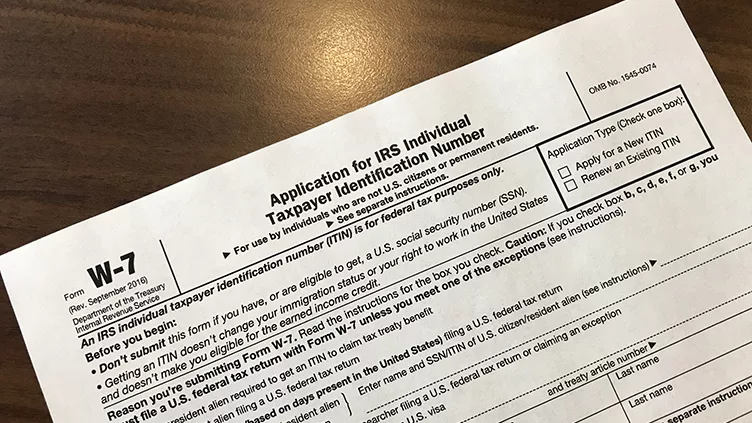An ITIN, or Individual Taxpayer Identification Number, is a tax processing number issued by the Internal Revenue Service (IRS) for individuals who are required to have a U.S. taxpayer identification number, but who do not have or are not eligible to obtain a Social Security Number (SSN). ITINs are used for federal tax purposes only and are issued regardless of immigration status.
ITINs were created in 1996 as a way for individuals who are not eligible for SSNs to pay taxes and comply with tax laws. They are commonly used by nonresident aliens, resident aliens, and other individuals who have federal tax reporting or filing requirements.
To obtain an ITIN, an individual must complete IRS Form W-7 and provide documentation to prove their identity and foreign status. Acceptable forms of documentation include a valid passport, a foreign birth certificate, and a national identification card. The IRS may also require additional documentation depending on the individual’s situation.
Once an ITIN is issued, it is valid for the life of the individual unless it is not used on a tax return for a period of five consecutive years. In that case, the ITIN may become inactive and the individual may need to reapply for an ITIN.
There are several situations in which an individual may need to apply for an ITIN. For example, an ITIN may be necessary for an individual who is not eligible for an SSN and needs to file a tax return, claim a tax treaty benefit, or receive a distribution from a qualified foreign pension plan. ITINs are also commonly used by individuals who receive income from sources outside the United States and need to report that income on their tax returns.
In addition to being used for tax purposes, ITINs can also be used to open a bank account, apply for a mortgage, or enroll in certain government programs. However, it is important to note that an ITIN is not the same as an SSN and does not confer any immigration status or work authorization.
In summary, an ITIN is a tax processing number issued by the IRS to individuals who are required to have a U.S. taxpayer identification number but do not have, or are not eligible to obtain, an SSN. ITINs are used for federal tax purposes and may be necessary for individuals who need to file a tax return, claim a tax treaty benefit, or receive a distribution from a qualified foreign pension plan. While an ITIN can be used for certain financial and government purposes, it does not confer immigration status or work authorization.
Some of the benefits of an ITIN include:
- Ability to file federal tax returns: One of the primary benefits of an ITIN is that it allows individuals to file federal tax returns and pay taxes in the United States, even if they do not have an SSN. This can be especially important for individuals who receive income from sources outside the United States and need to report that income on their tax returns.
- Claim tax treaty benefits: Individuals with an ITIN may be able to claim certain tax treaty benefits, such as a lower tax rate or exemption from taxes on certain types of income.
- Receive distributions from a qualified foreign pension plan: An ITIN may be required in order to receive distributions from a qualified foreign pension plan.
- Open a bank account: Some banks may allow individuals with an ITIN to open a bank account, even if they do not have an SSN.
- Apply for a mortgage: Some mortgage lenders may accept an ITIN in place of an SSN when evaluating an application for a mortgage.
- Enroll in certain government programs: In some cases, an ITIN may be necessary in order to enroll in certain government programs or services.
It is important to note that while an ITIN can provide these benefits, it is not the same as an SSN and does not confer any immigration status or work authorization.
